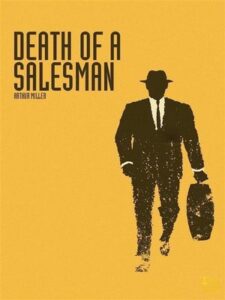Inside the dimly lit corridors of Yankee ambition, in which dreams collide with reality, lies “Death of a Salesman”—a play that reverberates with the echoes of shattered hopes and unfulfilled guarantees. Written by Arthur Miller in 1949, this undying masterpiece dissects the human situation, the pursuit of achievement, and the tragic effects of out-of-place aspirations.

The Loman Saga
On the coronary heart of the “Death of a Sales Man” stands Willy Loman, a weary visiting salesman. His existence is a sequence of omitted possibilities, dashed goals, and constant self-fantasy. Let’s explore the layers of this poignant drama:
1. The American dream
Willy clings to the Yankee dream—the perception that tough artwork, charisma, and determination will result in prosperity. He yearns for success, wealth, and the admiration of others.
However, because of the fact the play unfolds, we witness the chasm between Willy’s aspirations and his truth.
2. The Tragic Flaw
Willy’s tragic flaw lies in his loss of potential to distinguish between phantasm and reality. He lives in a global of fantasies, in which popularity equates to fulfillment. His obsession with being “properly-favored” blinds him to the cruel realities of his existence.
3. The dysfunctional family
The Loman family is a microcosm of fractured relationships. Willy’s partner, Linda, is the silent witness to his decline. Their sons, biff and satisfied, grapple with their disillusionment. Biff, as soon as a promising athlete, now struggles to discover his purpose.
The requiem
The play culminates in a requiem, a somber reflected photo of Willy’s lifestyle. His loss of life is not certainly bodily; it’s the death of an entire worldview. Due to the fact the characters gather, we confront the hollowness of Willy’s goals and the tragedy of unfulfilled capacity.
Legacy and effect
Pulitzer Prize: “Death of a Salesman” received the Pulitzer Prize for Drama in 1949. Its effect reverberates through generations.
Conventional troubles: miller’s exploration of identity, his family dynamics, and the rate of ambition transcends time and borders.
As we step into the Loman family, we grapple with our private dreams, our illusions. “Death of a Salesman” invitations us to impeach what it way to succeed, to be properly preferred, and to find out this means that in a worldwide that often sells us fake guarantees.
